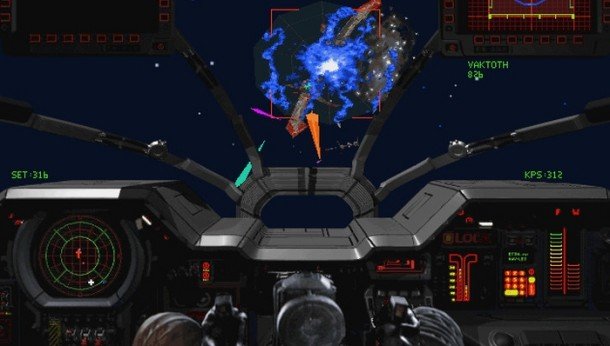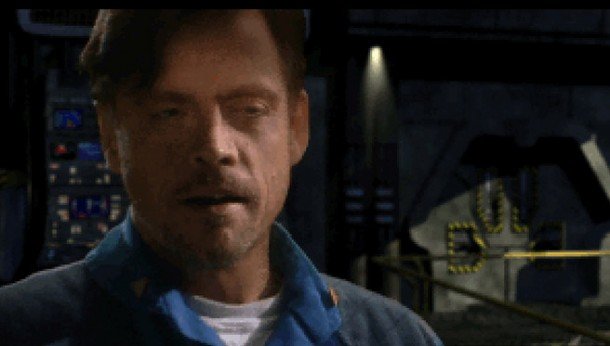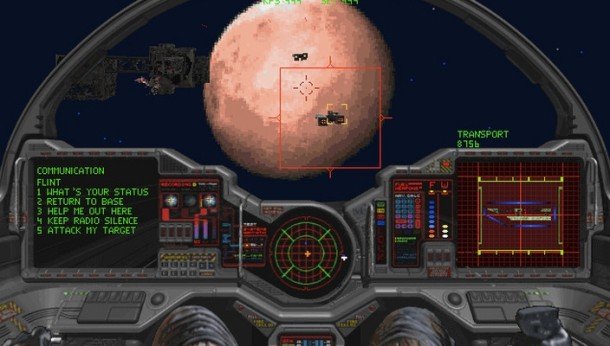Wing Commander 3 remains one of the few attempts at making an interactive movie that worked
Reinstall.

Reinstall invites you to join us in revisiting classics of PC gaming days gone by. This week, we set a course through space for a simpler time, when $4 million was considered a lot of money to spend making a game.
During the '90s, PC gaming caught a disease, and its name was FMV. Fueled by the power to fill CDs with video, and filled with the kind of starry-eyed Hollywood dreams that typically end with a naïve starlet desperately trying to scour the shame away with a wire brush, the industry set out to not merely make games, but interactive movies.
Wing Commander 3 is one of the very, very few examples where it worked. The series had always had a cinematic flair, with a huge cast of characters, animated sequences for everything from taking off from your fleet carrier to being awarded a medal of bravery for surviving ejecting into space. It had a then-wild budget of four million dollars, a cast headed up by Mark "Luke Skywalker" Hamill, an epic branching storyline, and—this definitely helped a little—jaw-dropping space combat.
Even now, with the ropey-effects, chunky FMV, and the realization that said combat really hasn't aged well, Wing Commander 3 holds onto a surprising amount of majesty. The opening chords in the soundtrack are powerful and bombastic. Our first scene is of the triumph of series baddies the kilrathi, and not merely over a group of nameless mooks, but Angel, both lead character Col. Blair's lover, and one of the series' most prominent pilots from the very start. Everything you see is in service of one single statement: Wing Commander 3 means business.
What makes it interesting now is how it tells its story. Beat-for-beat, it's a collection of fairly generic sci-fi clichés connected with space battles. Rarely, however, has such a cinematic game served up such an intentionally depressing tone. Earth is losing the war. Blair, heroic and dedicated to the fight as he is, is visibly on the edge of exhaustion after a lifetime spent fighting the same endless war, and all-too aware that all his heroism and sacrifices have achieved is to buy humanity a little more time to ponder its inevitable demise.
It's no coincidence that we first see him staring at the crashed wreckage of the Concordia, the carrier from Wing Commander 2, or that his new assignment is aboard a ship barely held together by rust and tradition.

That bleakness works beautifully, giving the uplifting moments something to contrast with. As hammy as the acting often is (the captain's enthusiastic declaration of "God, I love that boy's spunk!" so much so that Origin knowingly made it an official soundcard test noise), there's a genuine warmth to it. Blair's growing bonds with the Victory's crew, helped by the fact that you get to walk around between missions and think of it as home, are in stark contrast to the way games like X-Wing and Freespace 2 saved their focus for the combat.
Keep up to date with the most important stories and the best deals, as picked by the PC Gamer team.
Here, both sides of the experience matter. You can be chewed out for being antisocial and not engaging with the crew. You can even be called out for favouritism if you constantly fly with the same wingman. In one memorable moment, you can even let Blair go on a depression-induced bender before being forced into action by an enemy attack. Sadistically, it's one of the hardest fights in the game even if you're sober. All of this remains excellent stuff, and far more advanced than most interactive movies.

Actual combat on the other hand really struggles to be exciting. Even in the Wing Commander series' prime, fans of the X-Wing games would loudly proclaim how much better their space combat was. In our post-Freespace 2 world, it's exceptionally hard to go back. The enemy AI is terrible, the once system-crushingly amazing graphics are no longer impressive, and only a few details, such as the visible cockpit, in-mission videos, and the fact that your wingmen can die for real, still feel like interesting enough quirks to be worth mentioning.
The best bits are when the plot becomes more interactive, with choices like trying to dogfight a kilrathi ace or return to your rapidly fleeing carrier, but those happen all too rarely. Worse, the further you get, the harder it is to claw back from defeat. Early on, you'll often get a chance, but as of the second half, you're simply given a ring-side seat to watch the kilrathi curb-stomp Earth.
Still, Wing Commander 3 could definitely have aged worse, and the fact that you can switch on invulnerability in the options menu without any form of penalty means that you shouldn't let it put you off. At the very least, it's a great way to understand just what the hell convinced people that interactive movies were the future—from the cinematic style, to its ambition, to the way it used FMV to create a world instead of to cover a gaping hole where its soul should have been. It was an amazing game for its day, and it's still a movie worth starring in.

